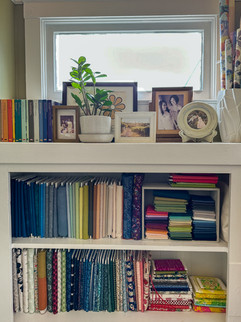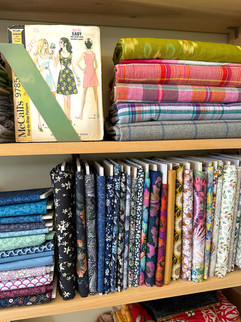The Great Sewing Room Makeover - Part 1
- Radha

- Dec 30, 2022
- 3 min read
Updated: Jul 19, 2023
My tips for a functional and inspiring sewing or crafting space (Part 1). And how I organized, upcycled and then donated to spend $0 and have almost zero waste (Part 2)!

"This time make it functional." - me after many failed makeover attempts
It's one thing to organize and destash your fabric, fold up your WIPs and clear off surfaces, but it's a whole other thing to create a layout and organization system that you can maintain and that makes your life easier. I've done plenty of cleaning and putting things in piles over the last year, but I could never maintain my space. So, when I set out on the Great Sewing Room Makeover, I knew I needed to approach it differently: with a room layout plan.
Sewing Room Layout Priorities
You are probably thinking - of course that's what any organized person would do when they were going to makeover a room. Except I usually prefer to make things up as I go along, which is great for improv quilts but not so much for functional spaces. So, I used Illustrator to create a map of the room and added proportionally correct furniture so I could make a plan based on the following priorities.

For efficiency a workflow triangle between the sewing, cutting and ironing stations.
Space to walk. I know this seems obvious, but you'd be surprised how many things I used to climb over or squeeze by to access my stuff.
Cutting table accessible from at least three sides. My cutting table used to be blocked by a chair on one side and piles of nonsense on the other. Being able to walk around and approach my cutting from different angles was crucial.
Comfy nook. I'm not so great at work/life balance, whether during my corporate life or now as I'm starting my own business. Having an area to sit and drink tea was a step towards giving myself permission to rest and recharge.
"It's a workflow triangle! You know, like for kitchens." - me trying to explain to my husband why I need his help moving my desk for the 100th time.
Storage, but make it visible
I'm one of those people who if they can't see something they forget it exists. I've learned that I need my fabric visible, my rulers and scissors, my [insert craft supply here] visible. So, after figuring out the layout of my sewing room I had to make sure I had not just storage but the right kind of storage for me.

Open shelving is my favorite storage solution. Everything is visible and it's an opportunity to have fun with color and cool containers. I store most of my fabric on open shelving (in areas out of the sun), and then I mix in my patterns, containers with trims and zippers, and all my quilting and sewing books. I include fashion and design books I use for inspiration, and then because I don't have a separate library (ha!), I also have my entire book collection - just in case you want to read a British spy novel during tea breaks.
Wall storage is critical for small spaces. I use a pegboard system for my rulers and scissors. I mounted it in an oversized frame and then used wallpaper and cardstock to disguise it. And wall storage can go on not-walls. I mounted my hanging pocket storage organizer to the side of my ironing table to hold misc. tags and paper.
Hidden storage only works for me for specific categories like batting and fusible interfacing - things that I only need when I need them and until I need them it's totally fine to forget they exist. Under my sewing table is also all my muslin and natural canvas.

Boxes, bins, baskets and everything in between. I rely on a varied selection of vintage and new, wood, cardboard and plastic, woven and cloth containers of all sizes to fill my open shelving and sit under tables. Wide-mouth vases are great for paper and posters and umbrella stands for large rolls of fabric. Jewelry and makeup organizers for trims. And don't get me started on the possibilities of kitchen storage containers!
"Anything that can organize a kitchen can organize a sewing or craft room."- me again, although I bet I you could come up with something that wouldn't work if you thought really hard...
Making an Inspiring Space
To make your space inspiring you need to know what inspires you. I'm inspired by colors and texture. My life-long love of textiles is what drew me into sewing so long ago and quilting more recently. So, after the layout and the storage solutions I got to do the fun part: create beautiful color runs of fabric and little vignettes with a vintage pattern or a ceramic vase. The below moments inspire me - what inspires you?
Part 2 Coming Soon...
































Can I hire you to organize my office?